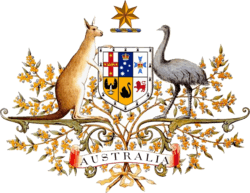South Australia v Commonwealth
| South Australia v Commonwealth | |
|---|---|
 | |
| Court | High Court of Australia |
| Full case name | South Australia v The Commonwealth |
| Decided | 23 July 1942 |
| Citation(s) | (1942) 65 CLR 373 |
| Case history | |
| Prior action(s) | none |
| Subsequent action(s) | none |
| Case opinions | |
|
(5:0) The Income Tax Act 1942 was valid under the taxation power (per Latham CJ, Rich, Starke, McTiernan and Williams JJ) (4:1) The State Grants Act 1942 was valid under the section 96 grants power (per Latham CJ, Rich, McTiernan and Williams JJ) (5:0) Section 221 of the Income Tax Assessment Act 1942 was valid (per Latham CJ, Rich, Starke, McTiernan and Williams JJ) (3:2) The Income Tax (Wartime Arrangements) Act 1942 was valid under the defence power (Rich, McTiernan and Williams JJ) | |
| Court membership | |
| Judge(s) sitting | Latham CJ, Rich, Starke, McTiernan and Williams JJ |
South Australia v Commonwealth (1942) 65 CLR 373 ("the First Uniform Tax case") is a High Court of Australia case that established the Commonwealth government's ability to impose a scheme of uniform income tax, ultimately arising in a vertical fiscal imbalance in the spending requirements and taxing abilities of the various levels of government.
Facts
In 1942, during the second world war, the Commonwealth government needed extra revenue for the war effort. At the time, income taxes were levied at both a state and federal level. The Commonwealth government wanted to become the sole income tax collector, with grants given back to the states to compensate for the lost revenue. The states rejected such a system, fearing the Commonwealth would raise income taxes. As s51(ii) only allows the Commonwealth to impose federal taxation for federal purposes, it could not cover the field of taxation with any law. Nevertheless, the Commonwealth introduced a uniform income tax through an intricate scheme of four pieces of legislation.
- The Income Tax Act 1942 raised income tax levels to the existing state levels, setting it at such a rate that made it politically impossible for states to impose their own income taxes. The amount raised was enough to cover the war effort and grants for the states
- The States Grants Act 1942 provided a grant for each state equal to what it would have raised on its own income tax, on the condition that it did not raise its own income tax
- Section 221 of the Income Tax Assessment Act 1942 required taxpayers to meet their Commonwealth tax liabilities before state tax liabilities
- the Income Tax (Wartime Arrangements) Act 1942 required that the states transfer to the Commonwealth all state staff, offices, furniture and records used to collect income tax
The laws were challenged by the states of South Australia, Victoria, Queensland and Western Australia.
Decision
The High Court held the laws were valid, despite the practical result being the inability of the states to impose income tax.
The Income Tax Act 1942 was held to be valid despite the fact the rate was so high as to preclude the states from imposing income tax. As taxation is a non-purposive power, regardless of the object of the law, the subject matter was taxation, and hence valid under section 51(ii) of the constitution.
The States Grants Act 1942 was held to be valid, despite a section 96 issue. The Commonwealth can use the section 96 grants power to induce a state to exercise its own powers as well as abstain from using its powers. Hence the Commonwealth can do such things to encourage or discourage a state from exercising its powers. However, while it can induce such things, it cannot coerce a state into accepting a grant. Nonetheless, indirect compulsion is constitutional. While the Income Tax Act 1942 raised Commonwealth income tax rates to a level that made it politically impossible for the states to impose their own, this was not at the level of coercion that was prohibited. Latham CJ noted that the states still had the choice not to accept Commonwealth grants. McTiernan J also considered the Act valid under the defence power.
Section 221 of the Income Assessment Act 1942 was held to be valid pursuant to section 51(ii) or was at the least valid under the implied incidental power. The subject matter of the law and the purpose of the law were both with respect to matters of taxation. McTiernan J justified this section as valid under the defence power.
The Income Tax (Wartime Arrangements) Act 1942 was upheld by a majority under the defence power.
See also
References
- Winterton, G. et al. Australian federal constitutional law: commentary and materials, 1999. LBC Information Services, Sydney.